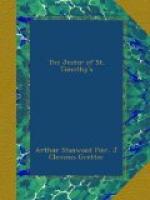“Please have this knife sharpened,” Irving said to the maid. She put down the potatoes and the corn, and departed with the instrument to the kitchen.
Irving glanced at the other tables; everybody seemed to have been served, everybody was eating; Scarborough, who was in charge of the next table, had entirely demolished his roast.
“I’m sorry to keep you fellows waiting,” Irving said, “but that’s the dullest knife I ever handled.”
He addressed the remark to the totally unprovided side of his table; he turned his head just in time to catch Westby’s humorous mouth and droll droop of an eyelid. The other boys smiled, and Irving’s cheeks grew more hot.
“You’ll excuse me, Mr. Upton, if I don’t wait, won’t you?” said Westby. “Don’t get impatient, fellows.”
The maid returned with the carving knife; Westby paused in his eating to observe. Irving made another unsuccessful effort; the meat quivered and shook and slid under his attack, and the knife slipped and clashed down upon the platter.
“Perhaps if you would stand up to it, sir, you would do better,” suggested Westby, in an insidious voice. “Nobody else does, but if it would be easier—”
“Thank you, but the suggestion is unnecessary,” Irving retorted. He added to the other boys, while he struggled, “It’s the meat, I guess, not the knife, after all—”
“Why, I shouldn’t say it was the meat,” interposed Westby. “The meat’s quite tender.”
Irving glanced at him in silent fury, clamped his lips together, and went on sawing. He finally was able to hand to Carroll a plate on which reposed a mussy-looking heap of beef. Carroll wrinkled his nose over it as Westby had done.
“If I might venture to suggest, sir,” said Westby politely, “you could send it out and have it carved in the kitchen.”
Irving surrendered; he looked up and said to the maid,—
“Please take this out and have it carved outside.”
He felt that he could almost cry from the humiliation, but instead he tried to assume cheerfulness and dignity.
“I’m sorry,” he said, “to have to keep you fellows waiting; we’ll try to arrange things so that it won’t happen again.”
The boys accepted the apology in gloomy silence. At Scarborough’s table their plight was exciting comment; Irving was aware of the curious glances which had been occasioned by the withdrawal of the roast. It seemed to him that he was publicly disgraced; there was a peculiar ignominy in sitting at the head of a table and being unable to perform the simplest duty of host. Worst of all, in the encounter with Westby he had lost ground.
The meat was brought on again, sliced in a manner which could not conceal the unskillfulness of the original attack.
“Stone cold!” exclaimed Blake, the first boy to test it.
Irving’s temper flew up. “Don’t be childish,” he said. “And don’t make any more comments about this matter. It’s of no importance—and cold roast beef is just as good for you as hot.”




